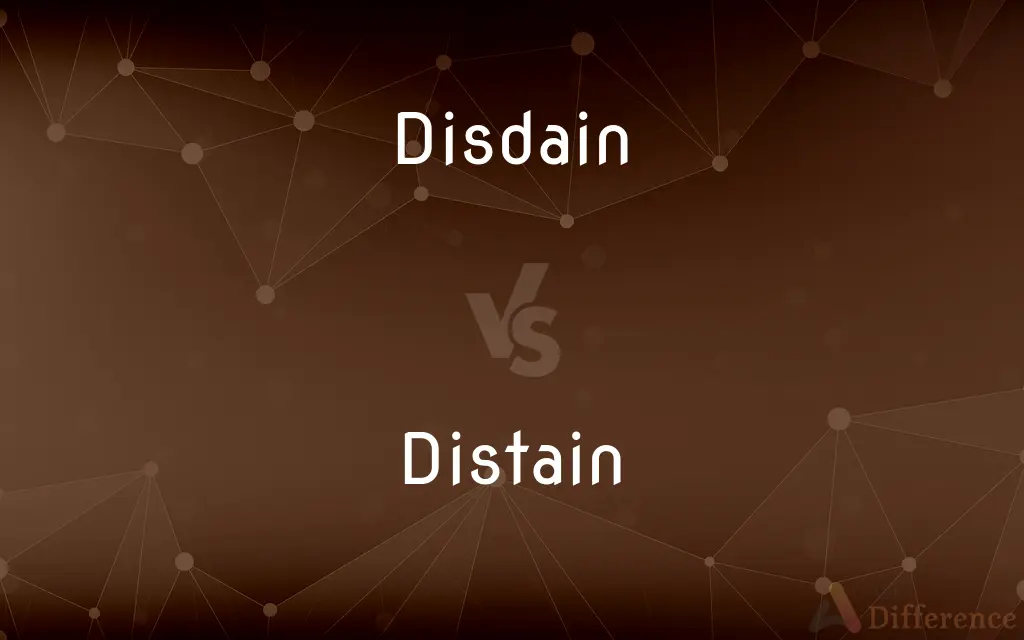Disdain vs. Distain — What's the Difference?
Edited by Tayyaba Rehman — By Maham Liaqat — Updated on March 22, 2024
Disdain refers to a feeling of contempt or scorn towards something, while distain is a less common term that means to tarnish or stain something, often used in a literal or figurative sense.

Difference Between Disdain and Distain
Table of Contents
ADVERTISEMENT
Key Differences
Disdain is an emotion or attitude of scornful aloofness, indicating a lack of respect or an intense dislike for someone or something. It implies a sense of superiority or a judgment that something is unworthy of one's consideration. On the other hand, distain, though much less frequently used in modern English, involves marking or coloring something, often with a negative connotation of tarnishing or blemishing. While disdain is about emotional rejection, distain concerns physical or metaphorical alteration.
When someone expresses disdain, they might do so through verbal cues, body language, or actions that demonstrate their low regard or contempt for another person, object, or idea. This could range from a dismissive gesture to outright derogatory comments. Conversely, to distain something, like a piece of fabric or one's reputation, would involve causing a visible mark or blemish, either literally by applying a stain or figuratively by damaging one's standing or character.
In literature, characters might show disdain for others based on differences in social status, moral values, or personal dislikes, often leading to conflicts or character development. Distain, although less common, could be used in a literary sense to describe a character or setting that has been morally or physically marred, contributing to thematic elements or plot progression.
The usage of disdain is prevalent across various forms of communication, from everyday conversations to formal writings, encapsulating a wide range of negative sentiments from mild irritation to profound repugnance. Distain, by contrast, is rarely used in contemporary language and might often be encountered in historical texts, poetry, or specific contexts where its use emphasizes a particular kind of defilement or dishonor.
In social interactions, displaying disdain can have a powerful impact, potentially alienating others or asserting a perceived hierarchy. Distaining something or someone, while less common as a term, suggests an act that leaves a lasting negative impression, often diminishing the value, purity, or perception of the affected.
ADVERTISEMENT
Comparison Chart
Definition
Contempt or scorn towards something or someone.
To tarnish, stain, or sully, literally or figuratively.
Usage
Emotional or attitudinal rejection.
Physical or metaphorical alteration.
Common Contexts
Interpersonal relations, literature, critiques.
Literature, historical texts.
Emotional Tone
Negative, indicating superiority or rejection.
Negative, implying damage or blemish.
Examples
Dismissive gestures, derogatory comments.
Staining a garment, tarnishing a reputation.
Compare with Definitions
Disdain
Contempt or scorn.
She looked at the untidy room with disdain, refusing to step inside.
Distain
To tarnish or blemish.
The scandal served to distain his once impeccable reputation.
Disdain
Rejection of something deemed unworthy.
He showed disdain for the job offer, considering it beneath him.
Distain
To mark with a color or stain.
The artist chose to distain the canvas with shades of gray to evoke sadness.
Disdain
Lack of respect.
The veteran player's disdain for the new coach created tension in the team.
Distain
To sully or defile.
The accusations distained the company's image, leading to a loss of trust.
Disdain
Feeling of superiority.
His disdain for popular culture made him avoid mainstream movies and music.
Distain
Figurative for damaging character.
His lies distained not only his own character but also those associated with him.
Disdain
Emotional aloofness.
Her disdain was evident in her cold response to their enthusiasm.
Distain
(rare) To stain, discolour or tarnish
Disdain
To regard or treat with haughty contempt
Critics who disdained the writer as a hack.
Disdain
To consider or reject (doing something) as beneath oneself
Disdained receiving an award from the organization.
Disdained to attend the ceremony.
Disdain
A feeling or show of contempt and aloofness; scorn.
Disdain
(uncountable) A feeling of contempt or scorn.
The cat viewed the cheap supermarket catfood with disdain and stalked away.
Disdain
(obsolete) That which is worthy to be disdained or regarded with contempt and aversion.
Disdain
(obsolete) The state of being despised; shame.
Disdain
(transitive) To regard (someone or something) with strong contempt.
Disdain
To be indignant or offended.
Disdain
A feeling of contempt and aversion; the regarding anything as unworthy of or beneath one; scorn.
How my soul is moved with just disdain!
Disdain and scorn ride sparkling in her eyes.
Disdain
That which is worthy to be disdained or regarded with contempt and aversion.
Most loathsome, filthy, foul, and full of vile disdain.
Disdain
The state of being despised; shame.
Disdain
To think unworthy; to deem unsuitable or unbecoming; as, to disdain to do a mean act.
Disdaining . . . that any should bear the armor of the best knight living.
Disdain
To reject as unworthy of one's self, or as not deserving one's notice; to look with scorn upon; to scorn, as base acts, character, etc.
When the Philistine . . . saw David, he disdained him; for he was but a youth.
'T is great, 't is manly to disdain disguise.
Disdain
To be filled with scorn; to feel contemptuous anger; to be haughty.
And when the chief priests and scribes saw the marvels that he did . . . they disdained.
Disdain
Lack of respect accompanied by a feeling of intense dislike;
He was held in contempt
The despite in which outsiders were held is legendary
Disdain
A communication that indicates lack of respect by patronizing the recipient
Disdain
Look down on with disdain;
He despises the people he has to work for
The professor scorns the students who don't catch on immediately
Disdain
Reject with contempt;
She spurned his advances
Common Curiosities
Can disdain be constructive?
While generally negative, disdain can sometimes motivate individuals to distance themselves from harmful influences or behaviors.
How can one avoid distaining something valuable?
Careful consideration, respectful treatment, and maintenance of one's integrity can prevent the figurative staining of something valuable.
Is disdain an innate or learned emotion?
Disdain can be both innate and learned, influenced by personal experiences, cultural norms, and individual temperament.
Can distain be used in a positive context?
Distain is predominantly used in negative contexts, but creatively, it could be employed to imply a significant, if not necessarily positive, transformation.
Can disdain be hidden or always visible?
Disdain can be both overt and covert, manifesting in explicit actions or subtle cues.
How can one respond to being the object of disdain?
Responses can include self-reflection, confrontation, seeking understanding, or choosing to disregard the disdainful sentiment.
How does societal disdain affect individuals or groups?
Societal disdain can lead to marginalization, reduced self-esteem, and conflict within communities.
Can distain be reversed or remedied?
Depending on the context, the effects of distain can sometimes be mitigated or reversed through restorative actions or changes in perception.
What causes someone to feel disdain?
Disdain often arises from perceived inferiority, ethical disagreements, or significant differences in taste or values.
Does disdain affect relationships?
Disdain can significantly strain or damage relationships, leading to alienation and conflict.
Is distain more often used metaphorically or literally?
In contemporary usage, distain is more commonly employed metaphorically, particularly in literary contexts.
Is distain still relevant in modern language?
While less common, distain can be used for stylistic or thematic effect, particularly in literature or poetic expression.
How does cultural background influence perceptions of disdain?
Cultural norms and values can shape what is considered disdainful, affecting both the expression and reception of disdain.
Does the intensity of disdain vary?
Yes, the intensity can range from mild annoyance to profound aversion.
Can distain be considered a form of criticism?
In a figurative sense, distain can imply a critical stance, particularly when it pertains to moral or ethical blemishes.
Share Your Discovery

Previous Comparison
Blindsight vs. Blindside
Next Comparison
Inject vs. InterjectAuthor Spotlight
Written by
Maham LiaqatEdited by
Tayyaba RehmanTayyaba Rehman is a distinguished writer, currently serving as a primary contributor to askdifference.com. As a researcher in semantics and etymology, Tayyaba's passion for the complexity of languages and their distinctions has found a perfect home on the platform. Tayyaba delves into the intricacies of language, distinguishing between commonly confused words and phrases, thereby providing clarity for readers worldwide.














































